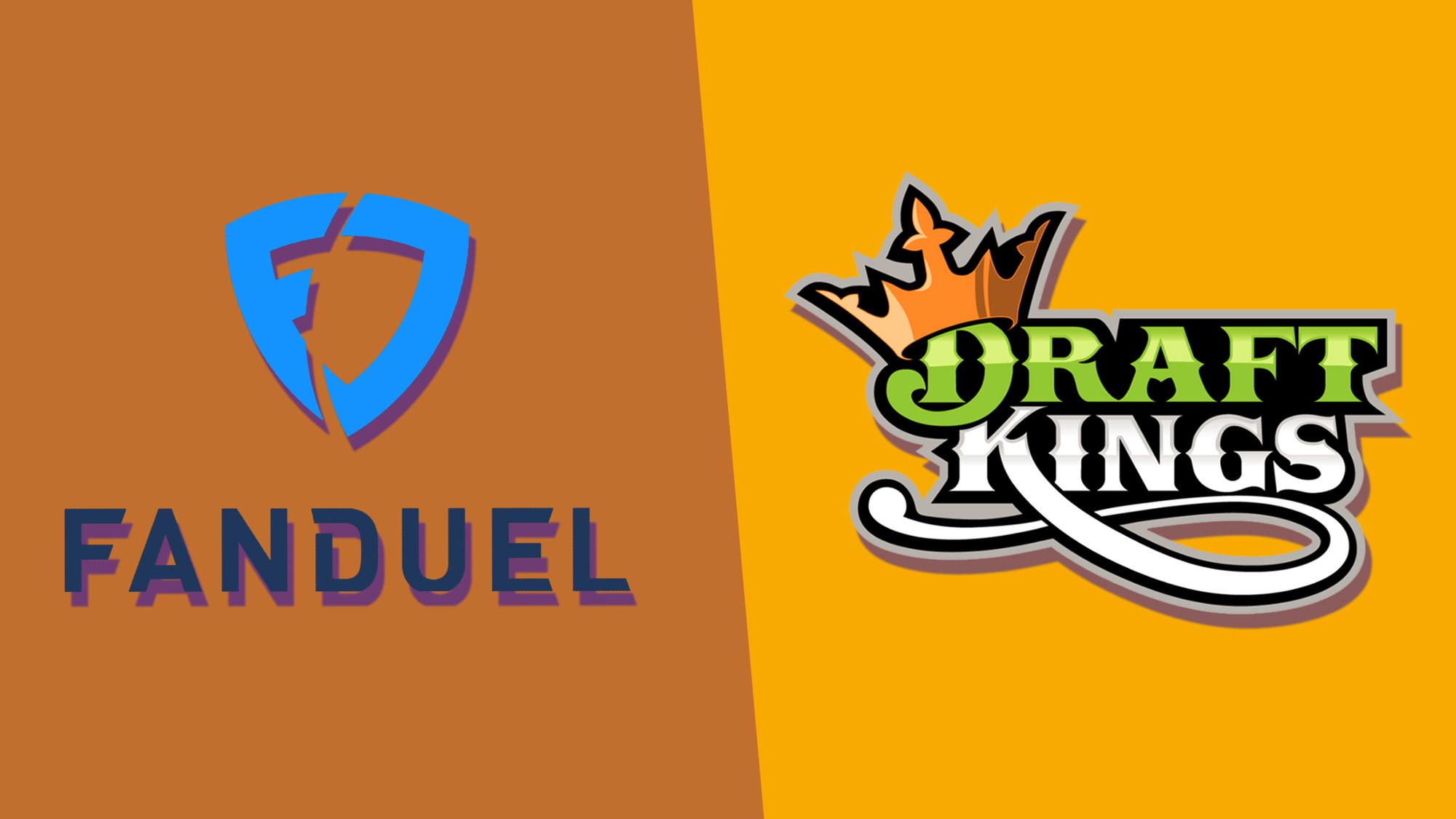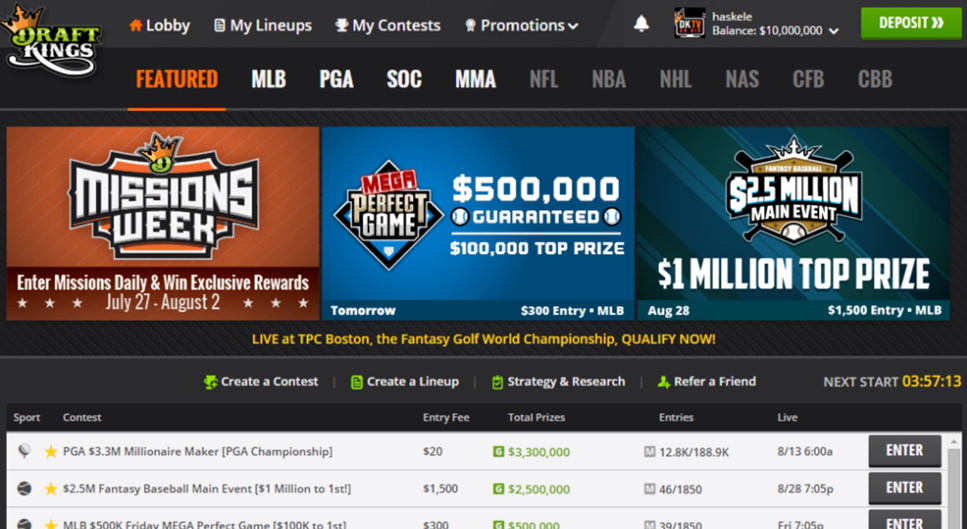FanDuel vs DraftKings: which is the best daily fantasy and sportsbook service?
The two doyens of daily fantasy go head-to-head

FanDuel and DraftKings are two of the world's most popular platforms for daily fantasy sports. Together, the two platforms have roughly 14 million users and have established partnerships with some of the biggest sporting leagues in the US.
On top of that, both FanDuel and DraftKings now offer sportsbooks to allow online sports betting. Competition between the two platforms in this realm is only likely to get fiercer as more and more states legalize online sports wagers.
Deciding whether FanDuel vs. DraftKings is the right platform for you can be tough. Both platforms have a lot to offer and neither has a clear lead over the other in the competition for daily fantasy players or online sports bets. To help you choose, we’ll walk you through an in-depth, head-to-head comparison of DraftKings and FanDuel.
Read more:
- TechRadar's full Fanduel review
- TechRadar's full DraftKings review
FanDuel vs DraftKings: available sports
DraftKings and FanDuel both offer daily fantasy matches and online wagers for most major US sports leagues. NFL, NBA, NHL, MLB, PGA, college basketball, college football, and NASCAR competitions are all available on either platform.
But, if you’re interested in international leagues, like the Canadian Football League or EuroLeague basketball, DraftKings is the way to go. DraftKings is also the only option if you want to play fantasy eSports or MMA fights (while both services have betting markets for both).
FanDuel vs DraftKings: where can you play and bet?
For daily fantasy, DraftKings and FanDuel are available in Canada and all 43 US states where this type of online gaming is legal. Residents of Arizona, Hawaii, Idaho, Montana, Nevada, and Washington are excluded at the time of writing. DraftKings has a slightly wider international reach, offering accounts in the UK, Germany, Ireland, Austria, and Malta.
Sign up for breaking news, reviews, opinion, top tech deals, and more.
If you want to use DraftKings or FanDuel for betting on mobile sports betting, DraftKings operates in more places. FanDuel is available in Indiana, West Virginia, Pennsylvania, and New Jersey only, and retail only in Iowa, Mississippi, and New York.

FanDuel vs DraftKings: fantasy games
In most major ways, daily fantasy games are pretty similar between FanDuel and DraftKings. But, the two platforms do have some distinguishing features that can affect your chances of winning and the quality of contests.
Salary Cap
Almost every contest on FanDuel, regardless of sport, has a fixed salary cap of $60,000. That’s higher than the cap for most contests on DraftKings, so it’s often quite a bit easier to field a high-scoring team with FanDuel.
In DraftKings’ model, the salary cap varies between sports and tournaments. That can add another dimension to fantasy games since it changes the math of how to draft a team. But, it can also work in favor of high-volume players and make it harder to win in large contests.
Contest Types
DraftKings and FanDuel offer many of the same popular contest types. Both platforms offer tournaments of all sizes with guaranteed payouts, head-to-head contests, and 50/50’s in which the top half of players win. But, there are a few contests unique to each platform.
On DraftKings, satellite contests are particularly neat. These are small fantasy tournaments with low entry fees. If you win a satellite contest, you’re entered into a larger, featured tournament at no cost. So, satellite contests offer any player a chance to compete in high-profile tournaments that are otherwise too expensive.
FanDuel’s advantage is that the platform is constantly experimenting with new, unique contests. For example, FanDuel hosted a home range challenge for the 2019 MLB season, in which only home runs counted towards players’ fantasy scores. The platform also tried out a positionless NBA league, in which you could draft any five players regardless of their positions. These types of contests add some excitement and diversity to FanDuel’s platform.
Late Swap
A major difference between FanDuel and DraftKings lies in the deadline for swapping players. On FanDuel, your roster is locked in as soon as the first games that are being counted for your contest begin. DraftKings allows a late swap, meaning you can switch out individual players from your lineup right up until the game that the particular player is in begins.
Late swap is particularly useful for NBA fantasy contests since the teams often don’t announce injuries until right before gametime. It can also be nice for MLB and NHL games, since lineups for games on the West Coast aren’t always announced before East Coast games begin.
- Best online casinos: discover the best services on the web
FanDuel vs DraftKings: sportsbook
When it comes to sports betting, DraftKings has the upper hand over FanDuel. While they both offer pretty much the same amount of sports to bet on, DraftKings has more available leagues in the most popular sports and operates in more states.
Even better, the DraftKings sportsbook includes gambling-specific statistics about individual teams and players. For example, you can quickly find information about how a team has performed against the spread over its last several games. FanDuel includes virtually no statistics at all on site, so you have to look elsewhere like its oddsFire service to figure out how to place your bets.
That said, DraftKings is noticeably more expensive than FanDuel for a lot of contests based on the odds being offered. If you’re looking to maximize your winnings, FanDuel is generally the better option.

FanDuel vs DraftKings: user interface
The FanDuel and DraftKings user interfaces are almost identical in all the ways that matter. Both have lobbies organized by sport. Both offer filters so you can find the exact contest you’re looking for. Both allow you to add players to your roster with a single click.
Even the mobile apps are very similar between the two platforms. On mobile devices, it’s easier to monitor live contests that you’ve entered into on the DraftKings app. FanDuel’s app, on the other hand, prioritizes a screen for connecting with friends to start new contests.
Why go for FanDuel
- Consistent salary cap simplifies daily fantasy games
- Unique, fun contests are frequently introduced
- Sportsbook offers less expensive odds
Why go for DraftKings
- Fantasy and betting for international sports leagues
- Satellite contests for winning entry into featured tournaments
- Allows late swapping players in your roster
- Sportsbook is available in 5 states and offers in-depth research
Verdict
Both FanDuel and DraftKings offer a lot of attractive features for playing daily fantasy sports. Ultimately, there’s no reason not to try out both. You can even use one platform or the other for specific sports—for example, take advantage of DraftKings’ late swap for NBA games, but use FanDuel for NFL fantasy because of the consistent salary cap.
When it comes to sports betting, DraftKings is the superior platform. But, if you’re in New Jersey and want to take advantage of FanDuel’s cheaper odds, you can use DraftKings for research and place your bet with FanDuel.
- Or check out the competition: our Yahoo! Sports review
Gambling responsibly
You probably don't need us to tell you that any form of gambling comes with serious risks and should never be undertaken as a silver bullet to solve your financial troubles. It's worth remembering the phrase...the house always wins!
If you suffer from a gambing problem or suspect somebody you know does, then we strongly suggest that you give the National Problem Gambling Hotline a call on 1-800-522-4700 to discuss it with a professional. It’s so important to make gambling safer for yourself and loved ones.
Michael Graw is a freelance journalist and photographer based in Bellingham, Washington. His interests span a wide range from business technology to finance to creative media, with a focus on new technology and emerging trends. Michael's work has been published in TechRadar, Tom's Guide, Business Insider, Fast Company, Salon, and Harvard Business Review.
